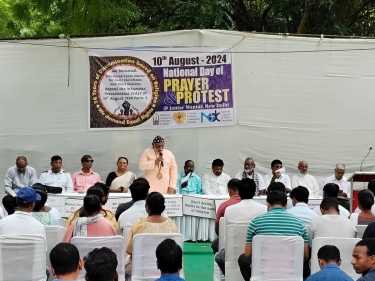
On 10 August 2024, Christians across India observed the annual National Day of Prayer and Protest, drawing attention to the ongoing struggle for equal rights among Dalit Christians and Muslims. The event, marking 74 years since the Constitution (Scheduled Castes) Order of 1950, focused on the denial of Scheduled Caste (SC) status to Christians and Muslims of Dalit origin, sparking nationwide demonstrations and prayer meetings.
In New Delhi, a significant prayer and protest session was organized at Jantar Mantar from 10 AM to 1 PM, jointly coordinated by the Catholic Bishops Conference of India (CBCI), the National Council of Churches in India (NCCI) and the National Council of Dalit Christians (NCDC). Hundreds of participants gathered to voice their concerns and offer prayers for justice.
The crux of the protest lies in the third paragraph of the 1950 Presidential Order, which stipulates that "no person who professes a religion different from Hinduism shall be deemed to be a member of Scheduled Caste." While subsequent amendments in 1956 and 1990 included Sikhs and Buddhists respectively, Christians and Muslims of Dalit origin remain excluded from SC status.
In Khammam district, Telangana, Bishop Sagili Prakash of the Catholic diocese led a powerful demonstration. The bishop called for the introduction of the Dalit Christian Bill in the current Parliamentary session and the implementation of recommendations from various commissions.
Protesters across the country highlighted that the exclusion perpetuates discrimination and denies them fundamental rights guaranteed by the Indian Constitution. They argue that the experience of untouchability coupled with extreme social, educational, and economic backwardness should be the criteria for SC status, regardless of religious affiliation.
The struggle for recognition has a long history, with numerous commissions and committees recommending the inclusion of Dalit Christians and Muslims in the SC category. The Kaka Kalelkar Commission (1955), Mandal Commission (1983), Sachar Committee (2006), and Ranganath Misra Commission (2007) all highlighted the need for granting SC status to Christian and Muslim Dalits.
A civil writ petition, filed by Adv. Franklin Caesar Thomas, is still pending before the Supreme Court of India. The National Council of Churches in India and the Catholic Bishops' Conference of India, representing major church bodies in India, are part of this petition challenging the constitutionality of the 1950 Order.
Protesters also drew attention to the Justice K.G. Balakrishnan Commission, appointed in October 2022 to examine the issue of SC status for Dalit Christians and Muslims. As the nation awaits the commission's findings and the Supreme Court's decision, the Dalit Christian community remains hopeful but frustrated by the continued delays.
Approximately 70% of India's Christian population comes from a Scheduled Caste background, and their unique history of faith experiences is deeply intertwined with their struggle against caste-based discrimination.




